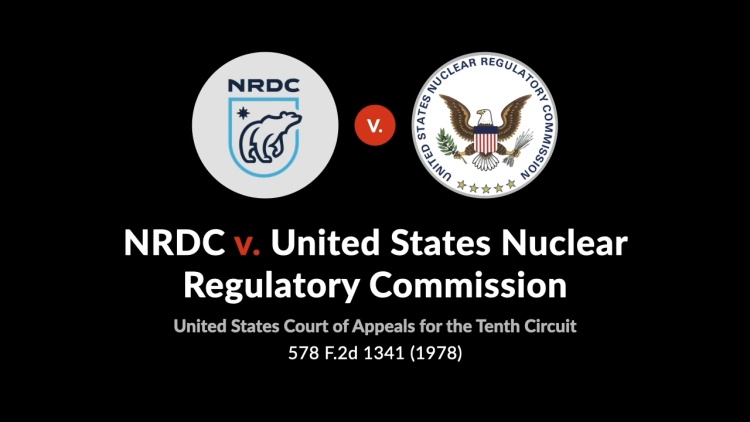Natural Resources Defense Council, Inc. v. United States Nuclear Regulatory Commission
United States Court of Appeals for the Tenth Circuit
578 F.2d 1341 (1978)
- Written by DeAnna Swearingen, LLM
Facts
The Atomic Energy Act of 1954, 42 U.S.C. §§ 2011-2296, allows the United States Nuclear Regulatory Commission (NRC) to issue licenses to operate uranium mills. The NRC, as a federal agency, must complete an environmental impact statement (EIS) before each issuance. However, the NRC may negotiate agreements with states, like New Mexico, allowing the states to issue licenses. State agencies are not required to complete EISs. The Natural Resources Defense Council, Inc. and others (plaintiffs) sued the NRC and the New Mexico Environmental Improvement Agency (NMEIA) (defendants) in the United States District Court for the District of New Mexico. The plaintiffs requested equitable remedies blocking the defendants from issuing licenses without preparing an EIS. The United Nuclear Corporation (United) was granted a license by NMEIA, but the plaintiffs seek to enjoin its issuance. United intervened. Subsequently, Kerr-McGee Nuclear Corporation (Kerr-McGee), another uranium mill operator, and the American Mining Congress (AMC) moved to intervene. Intervention as a matter of right was denied, because United adequately represented the interests of the intervenors. The court refused to allow permissive intervention, and Kerr-McGee and AMC appealed both denials to the United States Court of Appeals for the Tenth Circuit.
Rule of Law
Issue
Holding and Reasoning (Doyle, J.)
What to do next…
Here's why 907,000 law students have relied on our case briefs:
- Written by law professors and practitioners, not other law students. 47,100 briefs, keyed to 996 casebooks. Top-notch customer support.
- The right amount of information, includes the facts, issues, rule of law, holding and reasoning, and any concurrences and dissents.
- Access in your classes, works on your mobile and tablet. Massive library of related video lessons and high quality multiple-choice questions.
- Easy to use, uniform format for every case brief. Written in plain English, not in legalese. Our briefs summarize and simplify; they don’t just repeat the court’s language.






